 Following on the U.S. Dept. of Justice finding last March that the Republican-enacted polling place Photo ID restriction law in Texas was discriminatory, in violation of the U.S. Voting Rights Act (VRA), a three-judge U.S. District Court panel has again blocked the law from being implemented.
Following on the U.S. Dept. of Justice finding last March that the Republican-enacted polling place Photo ID restriction law in Texas was discriminatory, in violation of the U.S. Voting Rights Act (VRA), a three-judge U.S. District Court panel has again blocked the law from being implemented.
The decision by the federal panel, which included one judge appointed by George W. Bush, was unanimous.
Texas had appealed the DoJ decision earlier this year, seeking a declaratory judgment from the court, after the federal agency had found the state had not met its "burden of showing that a submitted change [to an election law] has neither a discriminatory purpose nor a discriminatory effect," under Section 5 of the VRA, which requires preclearance for new election laws in 16 different U.S. jurisdictions with a history of racial discrimination. The Lone Star State is one of those jurisdictions.
The DoJ had determined [PDF] that, based on the state's own statistics, the law would have disproportionately disenfranchised registered Hispanic voters in the state. They found that registered Hispanics are anywhere from 46% to 120% more likely than non-Hispanics to lack the type of state-issued Photo ID that would have now been required to vote under the new law.
The 56-page ruling by the U.S. District court panel in D.C. today [PDF] found that "the law will almost certainly have retrogressive effect" as "it imposes strict, unforgiving burdens on the poor, and racial minorities in Texas [who] are disproportionately likely to live in poverty."
"Crucially," the court added, "the Texas legislature defeated several amendments that could have made this a far closer case" when they ignored warnings that the law "as written, would disenfranchise minorities and the poor."
In Texas, as Democratic lawmakers had pointed out while the bill was being debated, some registered voters would have to travel as far as 250 miles round trip to receive their "free" ID from a state Dept. of Public Safety (DPS) driver's license facility, presuming they owned or were able to afford buy the underlying documentation required to obtain that "free" ID. The burden would be especially difficult for those without drivers licenses in the first place. Moreover, as the DoJ had previously found, "in 81 of the state’s 254 counties, there are no operational driver’s license offices," and many of them have limited hours of operation.
The court blasted both the Republican lawmakers and the attorneys who presented their case. "Everything Texas has submitted as affirmative evidence is unpersuasive, invalid, or both. Moreover, uncontested record evidence conclusively shows that the implicit costs of obtaining [Photo ID that would satisfy the new law] will fall most heavily on the poor and that a disproportionately high percentage of African Americans and Hispanics in Texas live in poverty. We therefore conclude that SB 14 is likely to lead to 'retrogression in the position of racial minorities with respect to their effective exercise of the electoral franchise.'"
This was the second stinging loss for Texas Republicans in one week. On Monday, their plan for Congressional Redistricting in the state, on the heels of four new seats gained after the 2010 Census, was also struck down by a three-judge federal panel for violations of the VRA...
In that case, the court also sided with the DoJ's earlier findings and determined that the GOP's new map was "enacted with discriminatory purpose". While 90 percent of the state's growth in population over the past ten years was thanks to racial minorities, the court found the new Congressional redistricting map, nonetheless, resulted in new seats for white Republicans in what the League of Women Voters described, according to Ari Berman at The Nation, as "the most extreme example of racial gerrymandering among all the redistricting proposals passed by lawmakers so far this year."
The decision to deny declaratory judgment in the Photo ID restriction case comes as a great victory for voters in the Lone Star State. Both it, and the Congressional Redistrictng law may be, and likely will be, appealed to the U.S. Supreme Court.
The ruling comes as South Carolina, whose Republican-enacted Photo ID restriction law was also found discriminatory by the DoJ earlier this year, begins their own appeal with a federal panel this week. In that trial, on Monday, the Republican lawmaker who sponsored the bill admitted during testimony that he was unable to cite any examples of polling place voter impersonation in the state's history that would have been prevented by the law. In-person polling place impersonation is the only type of voter fraud that can possibly be deterred by such laws.
A recent nationwide analysis of all election fraud cases since 2000, carried out by the investigative news consortium News21, found that there have been just 10 cases of in-person impersonation over the past 12 years.
On Tuesday, at the Republican National Convention in Tampa, SC's Republican Governor Nikki Haley blasted the Obama Administration for blocking her state's polling place Photo ID restriction law, claiming inaccurately that "you have to show picture ID to set foot on an airplane", and thus, "should have to show picture ID to protect one of the most valuable, essential, sacred and blessed rights within America, the right to vote."
While lacking a Photo ID will require a few extra security steps for passengers before boarding an airplane, the commercial airliners are not interested in turning away some 22 million potential American customers who do not own Photo ID, and so they have simple provisions for such cases. Haley's misleading comments were met with cheers from the misinformed Republicans at the gathering, but were not corrected by any of the multiple news networks covering the convention to our knowledge.
Prior to the new restrictions, South Carolina, which is also protected by Section 5 of the VRA, already had one of the most restrictive ID requirements in the nation. Voters had to present either a state-issued drivers license, a state-issue Photo ID card or their voter registration card before being allowed to vote. The new law only removes the third option. The DoJ has determined [PDF], however, as based on data supplied by the state, that registered African-American voters were 20% more likely than white voters to lack the type of ID that would be needed to vote under the new SC law.
The federal court ruling on whether SC's new polling place photo ID restriction law, one that is very similar to the Texas law rejected by the court today, is expected a month or so before this November's Presidential Election.


 From CA's 'Nuclear Deterrence' Map to Newsom's Trolling to Trump's 'Fascist Theatre' and Beyond: 'BradCast' 8/21/25
From CA's 'Nuclear Deterrence' Map to Newsom's Trolling to Trump's 'Fascist Theatre' and Beyond: 'BradCast' 8/21/25 'Green News Report' 8/21/25
'Green News Report' 8/21/25
 On 'Americanism' and Trump's 'Stalinesque' Plot to Whitewash U.S. History: 'BradCast' 8/20/25
On 'Americanism' and Trump's 'Stalinesque' Plot to Whitewash U.S. History: 'BradCast' 8/20/25 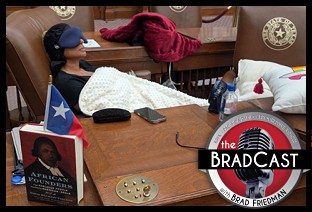 Texas GOP Imprisons Dem State Lawmaker in State House Chamber: 'BradCast' 8/19/25
Texas GOP Imprisons Dem State Lawmaker in State House Chamber: 'BradCast' 8/19/25 'Green News Report' 8/19/25
'Green News Report' 8/19/25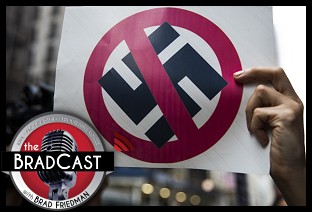 Trump, Nazis and
Trump, Nazis and  Sunday '
Sunday ' Newsom's 'Election Rigging Response Act'; FCC's License Renewal for Sock-Puppeting Sinclair: 'BradCast' 8/14/25
Newsom's 'Election Rigging Response Act'; FCC's License Renewal for Sock-Puppeting Sinclair: 'BradCast' 8/14/25 'Green News Report' 8/14/25
'Green News Report' 8/14/25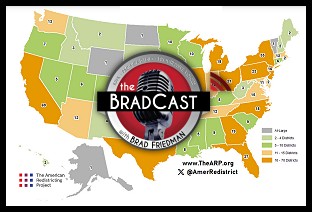 140 New House Reps?: Moving Beyond the Gerrymandering Wars: 'BradCast' 8/13/25
140 New House Reps?: Moving Beyond the Gerrymandering Wars: 'BradCast' 8/13/25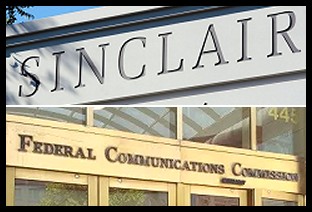 FCC Renews Sinclair TV Licenses Despite Complaint from Petitioner Who Died Waiting
FCC Renews Sinclair TV Licenses Despite Complaint from Petitioner Who Died Waiting It's Not About the Rule of Law, It's About Authoritarian Control: 'BradCast' 8/12/25
It's Not About the Rule of Law, It's About Authoritarian Control: 'BradCast' 8/12/25 'Green News Report' 8/12/25
'Green News Report' 8/12/25 After Vaccine Cancels, CDC Shooting, Former Officials Want RFK Out: 'BradCast' 8/11/25
After Vaccine Cancels, CDC Shooting, Former Officials Want RFK Out: 'BradCast' 8/11/25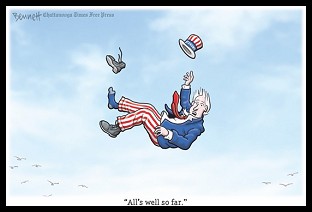 Sunday 'All's Well' Toons
Sunday 'All's Well' Toons 'Green News Report' 8/7/25
'Green News Report' 8/7/25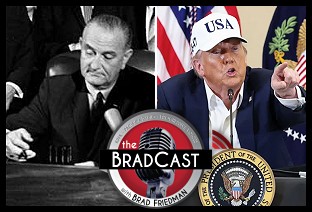 Trump Wars Against Greem Energy, Democracy on VRA's 60th: 'BradCast' 8/7
Trump Wars Against Greem Energy, Democracy on VRA's 60th: 'BradCast' 8/7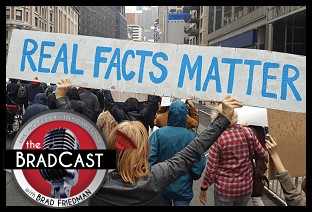 Media Conglomerates Continue Trump Capitulation: 'BradCast' 8/6/25
Media Conglomerates Continue Trump Capitulation: 'BradCast' 8/6/25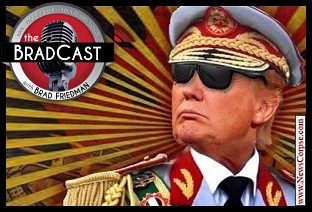 Banana Republican: Trump Shoots the Labor Statistics Messenger: 'BradCast' 8/5/25
Banana Republican: Trump Shoots the Labor Statistics Messenger: 'BradCast' 8/5/25 All's Fair in Love, War and, Apparently, Part-isan Gerrymandering: 'BradCast' 8/4/25
All's Fair in Love, War and, Apparently, Part-isan Gerrymandering: 'BradCast' 8/4/25 The Art of the Corrupt, Phony, Unlawful, Pretend Trade Deal: 'BradCast' 7/31/25
The Art of the Corrupt, Phony, Unlawful, Pretend Trade Deal: 'BradCast' 7/31/25 Battle Begins Against Trump EPA Climate Regulations 'Kill Shot': 'BradCast' 7/30/25
Battle Begins Against Trump EPA Climate Regulations 'Kill Shot': 'BradCast' 7/30/25 A Pu Pu Platter of Trump Corruption: 'BradCast' 7/29/25
A Pu Pu Platter of Trump Corruption: 'BradCast' 7/29/25 'Catastrophic' GOP Cuts to Medicaid, Medicare, ACA: 'BradCast' 7/28/25
'Catastrophic' GOP Cuts to Medicaid, Medicare, ACA: 'BradCast' 7/28/25
 VA GOP VOTER REG FRAUDSTER OFF HOOK
VA GOP VOTER REG FRAUDSTER OFF HOOK Criminal GOP Voter Registration Fraud Probe Expanding in VA
Criminal GOP Voter Registration Fraud Probe Expanding in VA DOJ PROBE SOUGHT AFTER VA ARREST
DOJ PROBE SOUGHT AFTER VA ARREST Arrest in VA: GOP Voter Reg Scandal Widens
Arrest in VA: GOP Voter Reg Scandal Widens ALL TOGETHER: ROVE, SPROUL, KOCHS, RNC
ALL TOGETHER: ROVE, SPROUL, KOCHS, RNC LATimes: RNC's 'Fired' Sproul Working for Repubs in 'as Many as 30 States'
LATimes: RNC's 'Fired' Sproul Working for Repubs in 'as Many as 30 States' 'Fired' Sproul Group 'Cloned', Still Working for Republicans in At Least 10 States
'Fired' Sproul Group 'Cloned', Still Working for Republicans in At Least 10 States FINALLY: FOX ON GOP REG FRAUD SCANDAL
FINALLY: FOX ON GOP REG FRAUD SCANDAL COLORADO FOLLOWS FLORIDA WITH GOP CRIMINAL INVESTIGATION
COLORADO FOLLOWS FLORIDA WITH GOP CRIMINAL INVESTIGATION CRIMINAL PROBE LAUNCHED INTO GOP VOTER REGISTRATION FRAUD SCANDAL IN FL
CRIMINAL PROBE LAUNCHED INTO GOP VOTER REGISTRATION FRAUD SCANDAL IN FL Brad Breaks PA Photo ID & GOP Registration Fraud Scandal News on Hartmann TV
Brad Breaks PA Photo ID & GOP Registration Fraud Scandal News on Hartmann TV  CAUGHT ON TAPE: COORDINATED NATIONWIDE GOP VOTER REG SCAM
CAUGHT ON TAPE: COORDINATED NATIONWIDE GOP VOTER REG SCAM CRIMINAL ELECTION FRAUD COMPLAINT FILED AGAINST GOP 'FRAUD' FIRM
CRIMINAL ELECTION FRAUD COMPLAINT FILED AGAINST GOP 'FRAUD' FIRM RICK SCOTT GETS ROLLED IN GOP REGISTRATION FRAUD SCANDAL
RICK SCOTT GETS ROLLED IN GOP REGISTRATION FRAUD SCANDAL VIDEO: Brad Breaks GOP Reg Fraud Scandal on Hartmann TV
VIDEO: Brad Breaks GOP Reg Fraud Scandal on Hartmann TV RNC FIRES NATIONAL VOTER REGISTRATION FIRM FOR FRAUD
RNC FIRES NATIONAL VOTER REGISTRATION FIRM FOR FRAUD EXCLUSIVE: Intvw w/ FL Official Who First Discovered GOP Reg Fraud
EXCLUSIVE: Intvw w/ FL Official Who First Discovered GOP Reg Fraud GOP REGISTRATION FRAUD FOUND IN FL
GOP REGISTRATION FRAUD FOUND IN FL

































